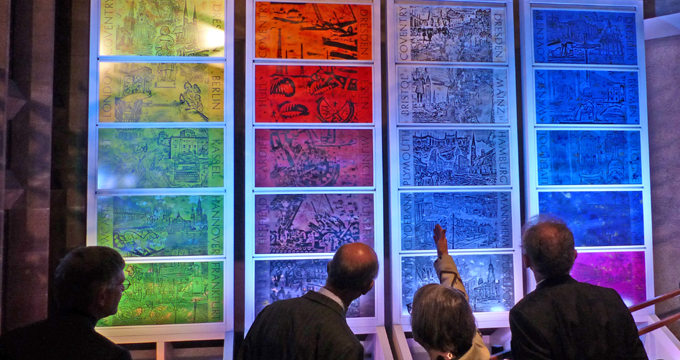Overview
Cultural Strategy – Executive Summary
The development of this strategy has been funded by Coventry City Council and Arts Council England (ACE) with support from both the University of Warwick and Coventry University and is based on an extensive consultation process. The strategy will continue to evolve over the ten year journey towards achieving its vision. It’s important that this strategy remains flexible and consultative in order to stay fresh and embrace new ideas, people and technologies. There will be an on-going research and evaluation process to regularly inform the implementation of the strategy. The strategy sets out a ten year vision for the cultural life of Coventry. The vision builds on the existing heritage and culture of Coventry and proposes five key goals for cultural growth in the city. Coventry Peace festival 2015
We set up Seven Big Ideas for transforming the cultural life of the city. The strategy also identifies some of the incremental changes that will, over a decade, transform Coventry into a recognised centre of national significance for its heritage and contemporary culture. These changes are based on the current cultural, economic and political landscape; being responsive to changing circumstances will keep the strategy live.
Cities that take culture seriously recognise that investments in culture have a wide range of other benefits which are both social and economic. A successful strategy needs to be distinctive, ambitious and based on a partnership that has a commitment and relevance to both the people and place of Coventry.
Coventry Peace festival 2015
We set up Seven Big Ideas for transforming the cultural life of the city. The strategy also identifies some of the incremental changes that will, over a decade, transform Coventry into a recognised centre of national significance for its heritage and contemporary culture. These changes are based on the current cultural, economic and political landscape; being responsive to changing circumstances will keep the strategy live.
Cities that take culture seriously recognise that investments in culture have a wide range of other benefits which are both social and economic. A successful strategy needs to be distinctive, ambitious and based on a partnership that has a commitment and relevance to both the people and place of Coventry.
What does this cultural strategy aim to do?
The cultural strategy aims to recognise and expand the opportunities that exist for residents to engage with, experience and enjoy the arts and heritage that surround them in all of their variety. Coventry has a proud city-wide culture of welcome and a reputation for being a place of peace and reconciliation. It is resilient and has adapted over history to many profound changes in its industrial and social landscape. It has a positive culture of re-invention and re-discovery. The cultural strategy will look forward to contributing to a city that is prepared to face the challenges of the future and build on its proud heritage and collective values. The strategy is designed to maximise the new partnerships that have come together to support the city’s bid to be UK City of Culture in 2021. This important initiative could be a transformational milestone in a ten-year journey towards a longer term cultural ambition. But, the ambitions presented in the strategy are not dependent on a successful bid. The process of bidding has already been transformational and the energy, enthusiasm and ambition of Coventry will be carried forward through the implementation of the Strategy. New partnerships, and extensive consultations and workshops with residents, artists and cultural organisations have established an on-going public dialogue about the future of cultural growth in Coventry. The cultural strategy calls for new partnerships between the city’s leading cultural organisations and the many community groups that offer neighbourhood cultural activity. This strong partnership approach will lead to new and radical opportunities to share resources, costs, and develop new arts projects that combine their artistic strengths. The partnership approach will make sure that there is clear signposting for cultural activities in the city so that all residents and visitors can be aware of what’s happening and where. A better connected and signposted cultural life will lead to more choices for people of all generations and backgrounds to participate across the city. It will also attract visitors to share in Coventry’s cultural wealth and energy. Motionhouse perform ‘Fragile’ at Godiva Festival
Motionhouse perform ‘Fragile’ at Godiva Festival
What does culture mean to Coventry?
The strategy covers the future of the city’s contemporary cultural and heritage assets. It aims to be inclusive of the many different ways and places in which residents use their leisure time and express themselves for a variety of purposes. This includes health, well-being, education and lifestyle choices. There is a wide range of publicly funded and commercially popular arts and heritage in the city. This includes: galleries and museums; heritage buildings and spaces; libraries and community arts groups; parks and open spaces; theatre; digital arts; film; dance; popular and classical music; Asian, African and East European arts; festivals and other community events. Through the consultation process we have learnt that that for many people sports, lifestyle, food, faith and heritage-based activities are an important part of their cultural lives. The architecture of Coventry has also been identified as a key aspect of its cultural DNA. This strategy recognises the value of these important activities and looks at how the arts and heritage in the city can connect and extend the choices residents have to lead more culturally fulfilling lives. Cultural activity is essential to a well-rounded education both in school and in the community and will give children, young people and others the creative skills, to problem solve, express themselves and develop their self-esteem and confidence. Investment in culture through supporting museums, libraries and other cultural resources has been shown to have positive economic outcomes for tourism and local businesses. The tourism and day-visitor potential of the city has not yet been realised and increasing visitors and their economic spend to the city is one of the strategy’s goals.When I became Chair of the Arts Council, one of the earliest things I talked about was what I called the ‘grand partnership’ – in a place where the universities, the city councils, the arts organisations and the heritage organisations and national agencies like the Arts Council work together, you can create a great place, you can really enrich the quality of life and that is what this cultural strategy is aiming to do. I want to say a particular congratulations and thanks to the City Council. We know that local authorities and government have been under enormous pressure in terms of funding over the last few years and where a council like Coventry City Council is remaining committed to the value and the power of arts and culture in difficult times, it is hugely appreciated and will be a great reward to the community.We’ve become a lot more articulate about the value of arts and culture in the last few years – we’ve developed the ‘holistic case’, the intrinsic value of arts and culture, identity and enrichment of life, entertainment, excitement and empathetic citizens. The value to society wherever you look; in prisons, in hospitals in care homes, you find the Arts doing a brilliant job. Arts and culture is absolutely integral to a great education. And then, there is of course the economic value; the local tourist offer, the health of the local creative industries, the sheer value of the life that will attract people to work and study in a particular place. We need arts and culture from all, for all and I welcome that ambition set out in this cultural strategy. Sir Peter Bazalgette, Chairman Arts Council England 2012-2017

